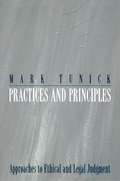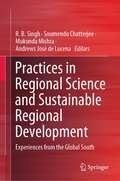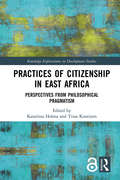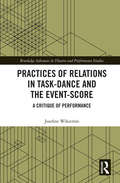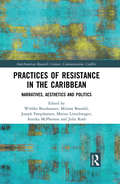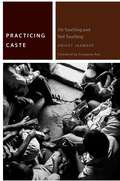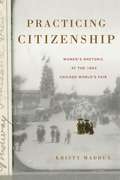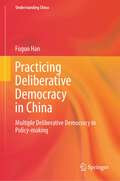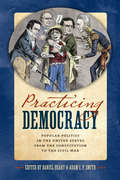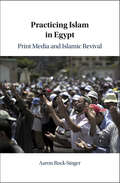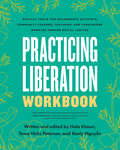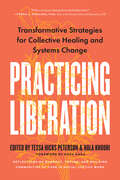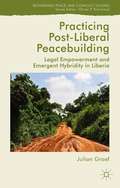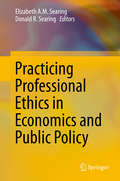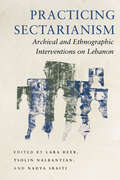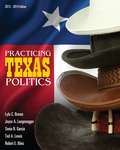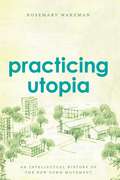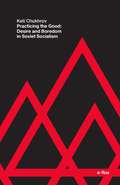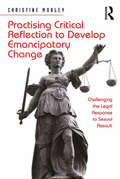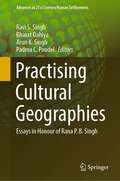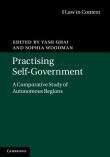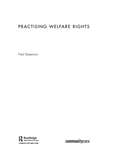- Table View
- List View
Practices and Principles: Approaches to Ethical and Legal Judgment
by Mark TunickA Japanese woman living in California attempts parent-child suicide, an ancient Japanese custom called "oyako-shinju," in order to rid herself of shame upon learning that her husband has a mistress. She survives, but her two children are drowned in the attempt. Since her attempt was made in accordance with the standards of Japanese culture, should she be tried by the standards and laws of the United States? Are there universally valid moral principles that dictate what is right? Or are moral judgments culturally relative, ultimately dictated by conventions and practices that vary among societies? In Practices and Principles, Mark Tunick takes up the debate between universalists and relativists, and, in political philosophy, between communitarians and liberals, each of which has roots in an earlier debate between Kant and Hegel. Tunick focuses on three case studies: promises, contract law, and the Fourth Amendment issue of privacy. In his analysis, he rejects both uncritical deference to social practice and draconian adherence to principles when making legal and ethical judgments. He argues that we do not always need to choose between abstract principles and social practices. Sometimes we appeal to both; sometimes we need to appeal to shared social norms; and sometimes, where there is no ethical community, we can appeal only to principles. Ultimately, Tunick rejects simplified arguments that force us to choose between either practices or principles, universalism or relativism, and liberalism or communitarianism.
Practices in Regional Science and Sustainable Regional Development: Experiences from the Global South
by Soumendu Chatterjee R. B. Singh Mukunda Mishra Andrews José de LucenaThis book brings together the emerging trends and techniques incorporated in regional science during the first two decades of this millennium. The book includes systematic and analytical notes making scientific commentary on the innovative methods of regional development, measurement of the development, regional development models, and policy measures that have significant implications and wide applicability instrumental for India as well as the other global south countries. There is clear evidence in the global south of the uneven spatial distribution of resources, economic activities, literacy, and health conditions. The most striking fact is the coexistence of development and underdevelopment that makes the planning process complicated. This can hardly be explored without taking a deep insight into the matter of how the regional parameters are impacting regional society or economy to shape the development of that region. There can be no effective global policy framework that will be effective equally for each and every region to mitigate local issues of society or economy. It is here that the book integrates the efforts of practitioners working towards addressing these regional issues and striving for sustainable regional development through their innovative ideas.Through its contributions, the book addresses development issues, regional impact of climate change, social justice, migration, well-being, livelihood vulnerabilities, and regional urban-environmental issues from the standpoint of regional science. It is a significant resource for researchers of spatial science, and policy makers.
Practices of Citizenship in East Africa: Perspectives from Philosophical Pragmatism (Routledge Explorations in Development Studies)
by Tiina Kontinen Katariina HolmaPractices of Citizenship in East Africa uses insights from philosophical pragmatism to explore how to strengthen citizenship within developing countries. Using a bottom-up approach, the book investigates the various everyday practices in which citizenship habits are formed and reformulated. In particular, the book reflects on the challenges of implementing the ideals of transformative and critical learning in the attempts to promote active citizenship. Drawing on extensive empirical research from rural Uganda and Tanzania and bringing forward the voices of African researchers and academics, the book highlights the importance of context in defining how habits and practices of citizenship are constructed and understood within communities. The book demonstrates how conceptualizations derived from philosophical pragmatism facilitate identification of the dynamics of incremental change in citizenship. It also provides a definition of learning as reformulation of habits, which helps to understand the difficulties in promoting change. This book will be of interest to scholars within the fields of development, governance, and educational philosophy. Practitioners and policy-makers working on inclusive citizenship and interventions to strengthen civil society will also find the concepts explored in this book useful to their work.
Practices of Freedom
by Steven Griggs Aletta J. Norval Hendrik Wagenaar Steven Griggs Aletta J. NorvalThe shift from government to governance has become a starting point for many studies of contemporary policy-making and democracy. Practices of Freedom takes a different approach, calling into question this dominant narrative and taking the variety, hybridity and dispersion of social and political practices as its focus of analysis. Bringing together leading scholars in democratic theory and critical policy studies, it draws upon new understandings of radical democracy, practice and interpretative analysis to emphasise the productive role of actors and political conflict in the formation and reproduction of contemporary forms of democratic governance. Integrating theoretical dialogues with detailed empirical studies, this book examines spaces for democratisation, institutional design, democratic criteria and learning, whilst mobilising the frameworks of agonistic and aversive democracy, informality and decentred legitimacy in cases from youth engagement to the Israeli-Palestinian conflict.
Practices of Relations in Task-Dance and the Event-Score: A Critique of Performance (Routledge Advances in Theatre & Performance Studies)
by Josefine WikströmIn this study, Josefine Wikström challenges a concept of performance that makes no difference between art and non-art and argues for a new concept. This book confronts and criticises the way in which the dominating concept of performance has been used in Art Theory, Performance- and Dance Studies. Through an analysis of 1960s performance practices, Wikstrom focuses specifically on task-dance and event-score practices as well as through examination of the key philosophical concepts that are inseparable from such a concept of art, and are necessary for the reconstruction of a critical concept of performance such as: ‘practice’, experience’, ‘object’, ‘abstraction’ and ‘structure. This book will be of great interest to scholars, students and practitioner across dance, performance art, aesthetics and art theory.
Practices of Resistance in the Caribbean: Narratives, Aesthetics and Politics (InterAmerican Research: Contact, Communication, Conflict)
by Wiebke Beushausen Miriam Brandel Marius Littschwager Annika McPherson Julia Roth Joseph FarquharsonThe Caribbean has played a crucial geopolitical role in the Western pursuit of economic dominance, yet Eurocentric research usually treats the Caribbean as a peripheral region, consequently labelling the inhabitants as beings without agency. Examining asymmetrical relations of power in the Greater Caribbean in historical and contemporary perspectives, this volume explores the region’s history of resistance and subversion of oppressive structures against the backdrop of the Caribbean’s central role for the accumulation of wealth of European and North American actors and the respective dialectics of modernity/coloniality, through a variety of experiences inducing migration, transnational exchange and transculturation. Contributors approach the Caribbean as an empowered space of opposition and agency and focus on perspectives of the region as a place of entanglements with a long history of political and cultural practices of resistance to colonization, inequality, heteronomy, purity, invisibilization, and exploitation. An important contribution to the literature on agency and resistance in the Caribbean, this volume offers a new perspective on the region as a geopolitically, economically and culturally crucial space, and it will interest researchers in the fields of Caribbean politics, literature and heritage, colonialism, entangled histories, global studies perspectives, ethnicity, gender, and migration.
Practicing Caste: On Touching and Not Touching (Commonalities)
by Aniket JaawarePracticing Caste attempts a fundamental break from the tradition of caste studies, showing the limits of the historical, sociological, political, and moral categories through which it has usually been discussed. Engaging with the resources phenomenology, structuralism, and poststructuralism offer to our thinking of the body, Jaaware helps to illuminate the ethical relations that caste entails, especially around its injunctions concerning touching. The resulting insights offer new ways of thinking about sociality that are pertinent not only to India but also to thinking the common on a planetary basis.
Practicing Citizenship: Women’s Rhetoric at the 1893 Chicago World’s Fair (Rhetoric and Democratic Deliberation #20)
by Kristy MadduxBy 1893, the Supreme Court had officially declared women to be citizens, but most did not have the legal right to vote. In Practicing Citizenship, Kristy Maddux provides a glimpse at an unprecedented alternative act of citizenship by women of the time: their deliberative participation in the Chicago World’s Fair of 1893.Hailing from the United States and abroad, the more than eight hundred women speakers at the World’s Fair included professionals, philanthropists, socialites, and reformers addressing issues such as suffrage, abolition, temperance, prison reform, and education. Maddux examines the planning of the event, the full program of women speakers, and dozens of speeches given in the fair’s daily congresses. In particular, she analyzes the ways in which these women shaped the discourse at the fair and modeled to the world practices of democratic citizenship, including deliberative democracy, racial uplift, organizing, and economic participation. In doing so, Maddux shows how these pioneering women claimed sociopolitical ground despite remaining disenfranchised.This carefully researched study makes significant contributions to the studies of rhetoric, American women’s history, political history, and the history of the World’s Fair itself. Most importantly, it sheds new light on women’s activism in the late nineteenth century; even amidst the suffrage movement, women innovated practices of citizenship beyond the ballot box.
Practicing Citizenship: Women’s Rhetoric at the 1893 Chicago World’s Fair (Rhetoric and Democratic Deliberation)
by Kristy MadduxBy 1893, the Supreme Court had officially declared women to be citizens, but most did not have the legal right to vote. In Practicing Citizenship, Kristy Maddux provides a glimpse at an unprecedented alternative act of citizenship by women of the time: their deliberative participation in the Chicago World’s Fair of 1893.Hailing from the United States and abroad, the more than eight hundred women speakers at the World’s Fair included professionals, philanthropists, socialites, and reformers addressing issues such as suffrage, abolition, temperance, prison reform, and education. Maddux examines the planning of the event, the full program of women speakers, and dozens of speeches given in the fair’s daily congresses. In particular, she analyzes the ways in which these women shaped the discourse at the fair and modeled to the world practices of democratic citizenship, including deliberative democracy, racial uplift, organizing, and economic participation. In doing so, Maddux shows how these pioneering women claimed sociopolitical ground despite remaining disenfranchised.This carefully researched study makes significant contributions to the studies of rhetoric, American women’s history, political history, and the history of the World’s Fair itself. Most importantly, it sheds new light on women’s activism in the late nineteenth century; even amidst the suffrage movement, women innovated practices of citizenship beyond the ballot box.
Practicing Deliberative Democracy in China: Multiple Deliberative Democracy in Policy-making (Understanding China)
by Fuguo HanThis book argues that most public affairs can be openly discussed before consensus is reached, and people from different backgrounds should be encouraged to get involved in policy-making on an equal basis. This is considered multiple deliberative democracy. The book features in-depth discussions on why multiple deliberative democracy is needed in China, what specific procedures it entails, and how it is conducted in local communities across the country. In addition, it probes into the areas of public administration where multiple deliberative democracy can be employed to enhance informed decision-making on public affairs, such as community self-governance matters, matters to be voted on by the National People's Congress, collecting CPPCC motions, social organization (or corporation) consultation, vital planning schemes of the society, and citizen education. Furthermore, the monograph explores the pluralism in deliberative democracy, such as mass symposium, citizen (villager) BBS, community Internet BBS, discussions in open areas of the community, “vision workshops”, and citizen jury. It is concluded that thorough deliberation among citizens may profoundly impact the government’s informed-decision-making. The book exposes the readers to the democratic system of modern China and sheds lights on its contextualized, unique multiple deliberative democracy procedures and practices. University students, researchers, and practitioner in the fields of political science, public administration, and international relations, among others, may find this book informative and intriguing.
Practicing Democracy
by Eeva LuhtakallioThis book is about the mundane, local, every day practices that constitutes democracy. Focusing on France and Finland, the book defines politicization as the key process in understanding democracy in different cultural contexts and shows a nuanced picture of two opposite models of European politics.
Practicing Democracy: Popular Politics in the United States from the Constitution to the Civil War
by Daniel Peart Adam I. SmithIn Practicing Democracy, eleven historians challenge conventional narratives of democratization in the early United States, offering new perspectives on the period between the ratification of the Constitution and the outbreak of the Civil War. The essays in this collection address critical themes such as the origins, evolution, and disintegration of party competition, the relationship between political parties and popular participation, and the place that parties occupied within the wider world of United States politics. In recent years, historians of the early republic have demolished old assumptions about low rates of political participation and shallow popular partisanship in the age of Jefferson--raising the question of how, if at all, Jacksonian politics departed from earlier norms. This book reaffirms the significance of a transition in political practices during the 1820s and 1830s but casts the transformation in a new light. Whereas the traditional narrative is one of a party-driven democratic awakening, the contributors to this volume challenge the correlation of party with democracy. They both critique constricting definitions of legitimate democratic practices in the decades following the ratification of the Constitution and emphasize the proliferation of competing public voices in the buildup to the Civil War. Taken together, these essays offer a new way of thinking about American politics across the traditional dividing line of 1828 and suggest a novel approach to the long-standing question of what it meant to be part of "We the People."Contributors:Tyler Anbinder, George Washington University · Douglas Bradburn, Fred W. Smith National Library for the Study of George Washington at Mount Vernon · John L. Brooke, The Ohio State University · Andrew Heath, University of Sheffield · Reeve Huston, Duke University · Johann N. Neem, Western Washington University · Kenneth Owen, University of Illinois, Springfield · Graham A. Peck, Saint Xavier University · Andrew W. Robertson, Graduate Center of the City University of New York and Lehman College, CUNY
Practicing Islam in Egypt: Print Media and Islamic Revival
by Aaron Rock-SingerFollowing the ideological disappointment of the 1967 Arab-Israeli War, an Islamic revival arose in Egypt. Yet, far from a mechanical reaction to the decline of secular nationalism, this religious shift was the product of impassioned competition among Muslim Brothers, Salafis and state institutions and their varied efforts to mobilize Egyptians to their respective projects. By pulling together the linked stories of these diverse claimants to religious authority and tracing the social and intellectual history of everyday practices of piety, Aaron Rock-Singer shows how Islamic activists and institutions across the political spectrum reshaped daily practices in an effort to persuade followers to adopt novel models of religiosity. In so doing, he reveals how Egypt's Islamic revival emerged, who it involved, and why it continues to shape Egypt today.
Practicing Liberation Workbook: Radical Tools for Grassroots Activists, Community Leaders, Teachers, and Caretakers Working Toward Social Justice
by Tessa Hicks Peterson Hala Khouri Keely NguyễnThe accompanying workbook to Practicing Liberation: essential skills, exercises, and journal prompts for social-change workers to protect boundaries, prevent burnout, and nourish organizational cultures of resilience and careWhat do you imagine a better world to look, feel, and sound like?Practicing Liberation Workbook shows that nourishing our movements and communities depends on nourishing ourselves—and that centering rest, prioritizing joy, and celebrating creativity and radical imagination is necessary for long-term change. To be sustainable and realize the transformation we&’re working toward, we need to care for our body, mind, and spirit, even (and especially) when the needs of our communities are urgent.In this accompanying workbook to Practicing Liberation, editors Hala Khouri and Tessa Hicks Peterson respond to the real needs of activists and changemakers—like healing from stress and burnout, processing grief and rage, and addressing overwhelm and disconnection. Examples of practices include:Guided journal prompts for self-care critical reflections: Reflect on the ideas and practices you&’ve inherited around survival and self-care. What did you learn about survival in your family of origin? What did you learn about self-care?Embrace and release, an embodied exercise to support you in times of overwhelmShared reflections for building community: What experiences or circumstances have shaped you in your life? What gifts has this given you? What can&’t you see about the world as a result? What support would give you more tools or uplift your gifts in this work?Meditations for self-forgiveness, equanimity, and connection with nature Holding space and being present for others through embodied listeningReaders are invited to try out the practices alone, with friends, in ceremony, at work, and in nature—to pick those that resonate most and use this toolkit in service of the care and transformation we each need to show up, sustain our work, and thrive for ourselves and our communities.
Practicing Liberation: Transformative Strategies for Collective Healing & Systems Change: Reflections on burnout, trauma & building communities of care in social justice work
by Tessa Hicks Peterson Hala KhouriHow do we do effective, sustainable social change…without burning out, internalizing systemic toxicity, or replicating urgency culture? A trauma-informed anthology with contributions from 13 activists and community organizers—for readers of adrienne maree brown, Staci K. Haines, and Ejeris DixonWhen your work is inextricable from your identity, your community, and your own liberation, you need a unique praxis of care to sustain it—and for mission-driven activists, organizers, and changemakers working under oppressive systems, making space to center vital needs like rest, self-care, and healthy boundaries isn&’t as simple as clocking out.Practicing Liberation reorients collective justice work toward a model that transforms the effects of injustice, harm, and oppressive systems into resilience, joy, and community care. Through frameworks like trauma-informed methodology, transformative movement organizing, engaged Buddhism, and healing justice, editors Hala Khouri and Tessa Hicks Peterson show readers how to:Embody healing, wellness, and beloved communityGuard against replicating systems of harmDisrupt racist, classist, anti-queer, and anti-trans behavior and systemsCelebrate creativity and radical imagination in movement workCenter healing from intergenerational trauma, white supremacy culture, and extractive capitalismHonor that self-care is a necessity—not a luxury—that strengthens our collectivesFeaturing essays from editors Hala Khouri and Tessa Hicks Peterson and contributors like Kazu Haga, Taj James, Nkem Ndefo, Jacoby Ballard, Sará King, Kerri Kelly, and more, Practicing Liberation can be used on its own or alongside The Practicing Liberation Workbook to help readers orient toward embodied leadership, interconnected collectives, and a bold vision for transformation—the vital tools we need for collective wellbeing, healing, and long-term social change.
Practicing Post-Liberal Peacebuilding
by Julian GraefPost-conflict peacebuilding interventions are complex processes. In order to make sense of such overwhelming complexity, the budding post-liberal literature in critical International Relations and Peace Studies has introduced the theory of hybridity. In Practicing Post-Liberal Peacebuilding, Julian Graef applies 'practice theory' to develop a critical methodology for mapping the shifting circulation of international power in a Liberian context. His study highlights the contested meaning ofemancipation in an emerging post-liberal world and draws from practice-based approaches to chart the ongoing process of translation that played out in the course of designing, implementing and evaluating an experimental legal empowerment intervention in rural Liberian communities. When these various points of translations are mapped, they reveal a series of performative discontinuities which, in turn, add up to a process of emergent hybridity. Such emerging hybrid processes are actively contesting the 'liberal' monopoly on the legitimate practice of justice in Liberia and creating post-liberal political space for new justice practices and different peacebuilding practitioners in Liberia. This innovative study will be of great interest to academics and practitioners in the fields of International Relations, African Politics and Conflict Resolution and Peace Studies.
Practicing Professional Ethics in Economics and Public Policy
by Elizabeth A.M. Searing Donald R. SearingThis volume explores the professional ethics of addresses the varied ethical needs of the professional economists and public policy professionals. Using terms and methods familiar to the reader, the book goes beyond the typical narrative of economics and morality to walk the professional through the process of ethical decision-making. Designed to be easy to navigate and applicable to everyday practice, this book includes a step-by-step illustrated guide through an ethical decision-making process using a methodology specifically tailored to economists and policy professionals. It describes numerous unique ethical tests and resolution methods which are utilized in a portfolio structure. The book also includes a brief and convenient catalogue of important figures in philosophy and ethics, translated into their policy applications; it concludes with candid advice from experts in different subfields on how ethics impacts their professional lives. This volume provides a foundation and framework for those in economics and public policy to implement a relevant practice of professional ethics both at and in their work.
Practicing Sectarianism: Archival and Ethnographic Interventions on Lebanon
by Lara Deeb, Tsolin Nalbantian, and Nadya SbaitiPracticing Sectarianism explores the imaginative and contradictory ways that people live sectarianism. The book's essays use the concept as an animating principle within a variety of sites across Lebanon and its diasporas and over a range of historical periods. With contributions from historians and anthropologists, this volume reveals the many ways sectarianism is used to exhibit, imagine, or contest power: What forms of affective pull does it have on people and communities? What epistemological work does it do as a concept? How does it function as a marker of social difference? Examining social interaction, each essay analyzes how people experience sectarianism, sometimes pushing back, sometimes evading it, sometimes deploying it strategically, to a variety of effects and consequences. The collection advances an understanding of sectarianism simultaneously constructed and experienced, a slippery and changeable concept with material effects. And even as the book's focus is Lebanon, its analysis fractures the association of sectarianism with the nation-state and suggests possibilities that can travel to other sites. Practicing Sectarianism, taken as a whole, argues that sectarianism can only be fully understood—and dismantled—if we first take it seriously as a practice.
Practicing Texas Politics (15th Edition)
by Lyle Brown Robert E. Biles Sonia R. Garcia Joyce A. Langenegger Ted A. LewisNew information about policymaking and analysis about politics in the Lone Star State is written by top Texas politics scholars.
Practicing Utopia: An Intellectual History of the New Town Movement
by Rosemary WakemanThe typical town springs up around a natural resource--a river, an ocean, an exceptionally deep harbor--or in proximity to a larger, already thriving town. Not so with "new towns," which are created by decree rather than out of necessity and are often intended to break from the tendencies of past development. New towns aren't a new thing--ancient Phoenicians named their colonies Qart Hadasht, or New City--but these utopian developments saw a resurgence in the twentieth century. In Practicing Utopia, Rosemary Wakeman gives us a sweeping view of the new town movement as a global phenomenon. From Tapiola in Finland to Islamabad in Pakistan, Cergy-Pontoise in France to Irvine in California, Wakeman unspools a masterly account of the golden age of new towns, exploring their utopian qualities and investigating what these towns can tell us about contemporary modernization and urban planning. She presents the new town movement as something truly global, defying a Cold War East-West dichotomy or the north-south polarization of rich and poor countries. Wherever these new towns were located, whatever their size, whether famous or forgotten, they shared a utopian lineage and conception that, in each case, reveals how residents and planners imagined their ideal urban future.
Practicing the Good: Desire and Boredom in Soviet Socialism (e-flux)
by Keti ChukhrovA philosophical consideration of Soviet Socialism that reveals the hidden desire for capitalism in contemporary anticapitalist discourse and theory This book, a philosophical consideration of Soviet socialism, is not meant simply to revisit the communist past; its aim, rather, is to witness certain zones where capitalism&’s domination is resisted—the zones of countercapitalist critique, civil society agencies, and theoretical provisions of emancipation or progress—and to inquire to what extent those zones are in fact permeated by unconscious capitalism and thus unwittingly affirm the capitalist condition. By means of the philosophical and politico-economical consideration of Soviet socialism of the 1960 and 1970s, this book manages to reveal the hidden desire for capitalism in contemporaneous anticapitalist discourse and theory. The research is marked by a broad cross-disciplinary approach based on political economy, philosophy, art theory, and cultural theory that redefines old Cold War and Slavic studies&’ views of the post-Stalinist years, as well as challenges the interpretations of this period of historical socialism in Western Marxist thought.
Practising Critical Reflection to Develop Emancipatory Change: Challenging the Legal Response to Sexual Assault
by Christine MorleyOverwhelmingly, critical practitioners working across a range of human service fields, who are committed to emancipatory and progressive social change ideals, report feeling powerless, alienated from the means of change, and hopeless about their capacities to make a difference in the lives of the individuals, groups or communities with whom they work because of restrictive contexts that ultimately determine the nature and parameters of their work. This ground-breaking book addresses this dilemma by demonstrating how critical reflection as an educational tool enables practitioners to envision possibilities for change. The legal system, particularly in its response to sexual assault provides a perfect example of this type of context and this volume explores the work of sexual assault practitioners that are engaged in supporting victims/survivors of sexual assault through the legal process. By reshaping ideas that have previously been considered as predominantly theoretical and abstract, Morley’s work provides an innovative framework that enables social work and human services practitioners to find hope, agency and practical strategies to work towards change, despite operating in contexts that appear immutably oppressive.
Practising Cultural Geographies: Essays in Honour of Rana P. B. Singh (Advances in 21st Century Human Settlements)
by Bharat Dahiya Arun K. Singh Ravi S. Singh Padma C. PoudelThis festschrift honours Prof. Rana P.B. Singh who has dedicated his life to teaching and conducting research on cultural geography with a ‘dweller Indian perspective’. The book focuses on the cultural geographies of India, and to an extent that of South Asia. It is a rich collection of 23 essays on the themes apprised by him, covering landscapes, religion, heritage, pilgrimage and tourism, and human settlements.
Practising Self-Government
by Yash Ghai Sophia WoodmanAutonomy provides a framework that allows for regions within countries to exercise self-government beyond the extent available to other sub-state units. This book presents detailed case studies of thirteen such autonomies from around the world, in which noted experts on each outline the constitutional, legal and institutional frameworks as well as how these arrangements have worked in practice to protect minority rights and prevent secession of the territories in question. The volume's editors draw on the case studies to provide a comparative analysis of how autonomy works and the political and institutional conditions under which it is likely to become a workable arrangement for management of the differences that brought it into being.
Practising Welfare Rights (The Social Work Skills Series)
by Neil BatemanPractising Welfare Rights aims to improve awareness among people working in social work and advice agencies about the skills required for effective welfare rights work, and offers guidance for managers and other professionals about how to develop a welfare rights service. Written by a well-known author, trainer and adviser on welfare rights issues, this book includes: learning objectives activities to test understanding illustrative case studies. It also covers core welfare rights skills, such as interviewing, legal research, negotiation and advocacy, and discusses the historical, social and economic forces which have shaped welfare rights practice as well as the politics of welfare. An accessible book which highlights the place of welfare rights practice in modern society.
